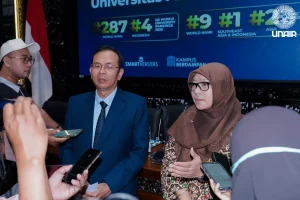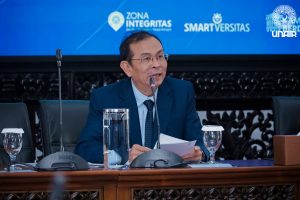UNAIR NEWS – Environmental issues should be prioritized as the problem gets even more serious. If the problem remains unsolved, it will result in dangerous environmental and health consequences. The role of government herein takes place.
Wahyu Eka Setyawan, Director of WALHI East Java, highlighted the issue in an open discussion forum. He pointed out that the state is responsible for environmental pollution problems.
“Government, as the national policyholder in environmental management, should pay attention to the social values,” said the Mining Advocacy Network (JATAM) activist.
Government has the responsibility for policy coordination on environmental pollution. “It is regulated in Law No. 32 of 2009 concerning Environmental Protection and Management (UU PPLH),” Wahyu added. Generally, UU PPLH covers three principles: prevention, mitigation, and environmental restoration. These principles aim to protect the community’s right to a healthy environment.
The productive author further stated that UU PPLH contains various important articles on environmental protection. Apart from recognizing environmental principles and community rights, UU PPLH also plays a role in strengthening environmental law. Institutions and licensing mechanisms in environmental management are also regulated by the law. Wahyu referred to the Rio Declaration, an international rule that underlies basic environmental management.
“There are three basic rights of the community. First, access to environmental information, public participation in policy formation, and access to justice,” he said.
The substance of UU PPLH and the community’s rights are threatened with the rise of the Omnibus Law. Wahyu named some cases where the government strictly limits the roles of activist and observer in preparing the Environmental Impact Analysis (AMDAL) for not being part of the ‘directly-affected community’.
The AMDAL Assessment Commission has disbanded and there is unconfirmed information regarding environmental feasibility. The central government also reduces the role of local governments in the supervision and imposition of sanctions.
It leads to the poor implementation of UU PPLH rooted in the unsynchronized government regulations and their institutions. For instance, the inconsistencies between UU PPLH, Coal and Mineral Mining Law (UU Minerba), Maritime Law (UU Kelautan), etc., and the constant conflict of interest among the government and the decreasing level of democracy that exacerbates the good environmental management.
Wahyu Eka Setyawan’s presentation was a part of “REACT: Legal Bootcamp 2022’ by the UNAIR Faculty of Law, reviewing the ‘Environmental Pollution Problems Due to Industrial Waste’. In collaboration with the Student Executive Board (BEM) of UNAIR Faculty of Law and the Center for the Law and Human Rights (HAM) Studies, the forum discusses the major themes that have become the main issues of today’s society.
Author: Deanita Nurkhalisa
Editor: Binti Q. Masruroh









